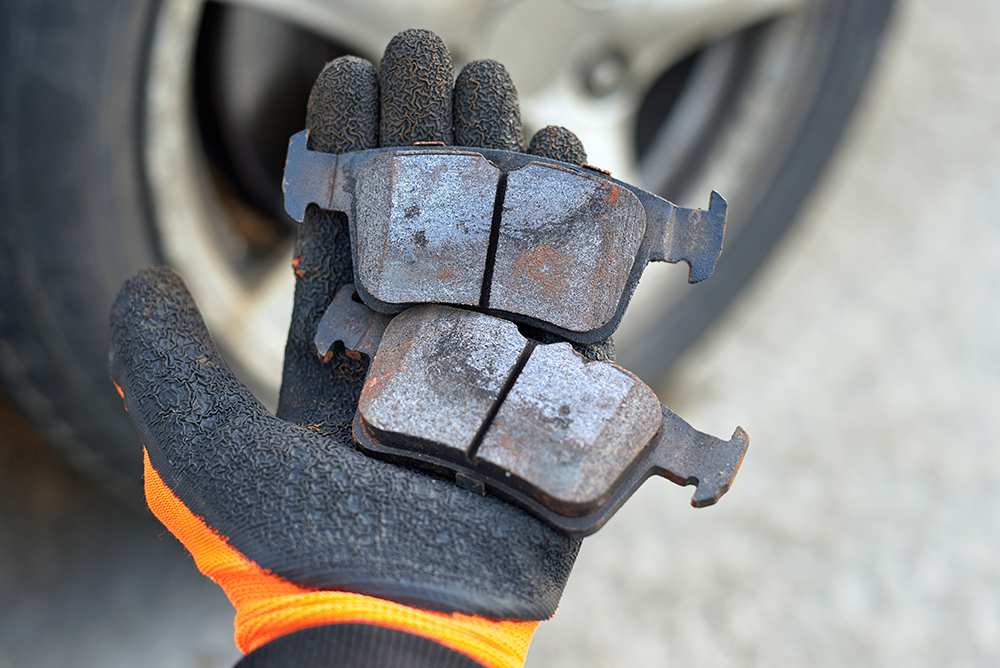When to Replace Brake Pads

Brake pads are a critical component of your vehicle's braking system. They play a pivotal role in ensuring your car stops efficiently and safely. Over time, however, brake pads wear down and need to be replaced to maintain optimal braking performance. Knowing when your brake pads are worn and require replacement is crucial for your safety and the longevity of your vehicle.
What Are Brake Pads?
Brake pads are flat, metal-backed plates that press against the rotor – the disc attached to each wheel – to create friction and slow the vehicle. This friction is what ultimately stops the car when you press the brake pedal. Brake pads are made from various materials, including organic, ceramic, and semi-metallic compounds, each offering different levels of performance, longevity, and noise.
Signs Your Brake Pads Are Worn
If your brake pads are failing, you'll know it. Here are some of the most common signs that its time to inspect and replace the brake pads on your vehicle.
- Squealing or Squeaking | One of the most common indicators that your brake pads are wearing out is a high-pitched squealing or squeaking noise when you apply the brakes. Most brake pads are equipped with a wear indicator, a small metal shim that emits this noise when the pads are nearing the end of their lifespan. If you hear this sound consistently, it's time to have your brake pads inspected.
- Grinding | If you ignore the squealing noise for too long, you might start to hear a grinding sound. This means that the brake pads are completely worn down, and the metal backing plate is now making contact with the rotor. Not only is this dangerous, but it can also cause significant damage to your rotors, leading to more expensive repairs.
- Longer Stopping Distances | As brake pads wear down, their ability to create friction decreases, which can lead to longer stopping distances. If you notice that your car takes longer to come to a complete stop or that you have to press the brake pedal harder than usual, it could be a sign that your brake pads are worn out.
- Vibration or Pulsation in the Brake Pedal | A vibrating or pulsating brake pedal is often a sign that your brake pads are unevenly worn or that your rotors are warped. This sensation can occur when the brake pads are not making uniform contact with the rotors, causing an irregular braking force.
- Thin Brake Pads | You can visually inspect your brake pads through the spaces in your wheels. If the pads appear to be less than a quarter of an inch thick, they likely need to be replaced. Thin brake pads cannot effectively generate the friction needed to stop your vehicle safely.
- Brake Warning Light | Many modern vehicles are equipped with a brake warning light on the dashboard. If this light comes on, it could indicate a problem with your braking system, including worn brake pads. It's important not to ignore this warning and to have your brakes checked as soon as possible.
Why Timely Brake Pad Replacement Is Important
Replacing your brake pads when they are worn is essential for maintaining your vehicle's safety and performance. Worn brake pads can lead to reduced braking efficiency, longer stopping distances, and an increased risk of accidents. Additionally, neglecting to replace worn pads can cause damage to other components of the braking system, such as the rotors and calipers, leading to more costly repairs.
The lifespan of brake pads varies depending on driving habits, the type of vehicle, and the type of brake pads used. Generally, brake pads should be replaced every 30,000 to 70,000 miles. However, it's important to have your brake pads inspected regularly by a trained and experienced mechanic, especially if you notice any of the warning signs mentioned above.
Brake pads are a crucial safety component of your vehicle, and knowing when they are worn and need to be replaced can help prevent accidents and costly repairs. Pay attention to the signs of worn brake pads, such as squealing noises, longer stopping distances, and vibrations in the brake pedal. Regular inspections and timely replacements will ensure your brakes remain in top condition, keeping you and your passengers safe on the road. If you're unsure of your vehicle's brakes or brake pads, stop into Metro Motor! We'd be happy to take a look.
Vehicle care information made available by Metro Motor is presented as helpful advice for general maintenance and should not be construed as instructions for at-home vehicle service. Be sure to consult your owner’s manual and a licensed, professional mechanic for diagnostics and repair.
